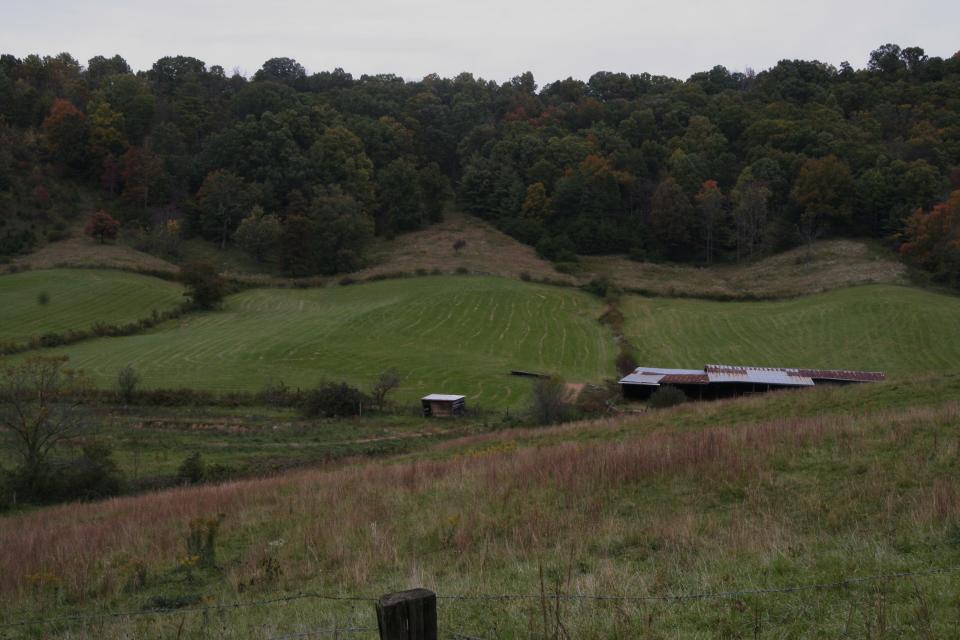Visiting Our Past: Development, taxes threatened preacher's farm in north Buncombe

"Let me tell you the difference in the Indian and the white people," a customer with Cherokee heritage told Steven Rice at his place of work on Hilliard Avenue in Asheville. "An Indian's word is as good as the water that flows in the stream ... as the leaves that come back on the trees. The white man's word is good until the legislature meets again."
The words struck a chord with Rice, and have stuck in his memory. They relate to the upbringing that his parents, Texie Shelton and Joe Rice, had given him and his brother on Wooten Cove Road in Brittain Cove. "They taught us to be honest, work hard and pay our debts," Rice says.
Hard work had enabled the Rices to hold onto their 34 1/2 acres in Brittain Cove since 1960, when Joe bought the place from Daisy Ward, who'd had to leave because her century-old house held sad memories of her family, all dead.
Joe built her a new home elsewhere in the community.
"My dad," Steven Rice says, "worked seven days a week, 365 days a year, for 16 years." Joe pastored a church, drove his wife to and from her job at Memorial Mission Hospital, managed Haymont Kennels, grew tobacco and hay, ran a farm in Madison County and took care of a herd of cows. There was never a family vacation.
Now (in 2008), legislation might take the farm away from the Rices — or preserve it.
The threatening legislation is poised to follow high-end development in the area, particularly on Whitted Knob, the Rices feel. It might pave, widen and build roads; bring in zoning regulations; put an end to noisy animals; allow soil erosion and water table drainage; and raise taxes.
Previous: Visiting Our Past: Good works and woodwork thrived in early Biltmore
A love of family history: Visiting our past: Grandma's stories sparked love of family history
With just the possibility of new development in Brittain Cove, the valuation of Rice's unimproved property jumped from about $100,000 to $400,000 in a few years. Rice had to sell five acres he owned in Marshall just to get a "stay of execution," he says.
"I don't want to see development come in, and I don't want to lose this place," Rice adds. "My dad had worked so hard. ... My goal is one day, with the help of the good Lord above, I want to pass this place on to my grandson. ... We're planning on putting the family cemetery over there in the pasture."
It was in that pasture that, as a young man, Steven and his friend, Larry Rogers, camped every Friday night during the summer. He'd drive his father's '55 Chevy ton truck, and they'd sleep under it or in the bed. They'd haul firewood and build a campfire, roasting hot dogs and potatoes.

Joe Rice's country memories are also strong, and go back further. When he first moved to the area, he had been working as a horse trainer and rider for W.A. VanStory Jr. and Dr. Crawford Gillespie. From the ridges of Brittain Cove, he traveled to Shelbyville, Tennessee, where the World Celebration of Walking Horses was held.
"A walking horse could walk as fast as a good horse could run," Rice relates. "You just touch him on either side, he went into that rocking chair canter."
Joe Rice's parents had gotten their children through the Depression in Madison County, partly with homegrown food. "You cut off a piece of that side meat (from a hog) and you give that pot of (pinto) beans a college education," Rice says. "My mother, when the thrashers came through in the fall, she'd stuff them straw ticks so full of straw, you had to jump to get into bed."

"We had boneset and skullcap for cold medicine. ... She'd give us a hot glass of that (tea), and we'd sleep on that straw tick, throw a feather bed on top of it. It could snow in the house, it wouldn't bother you. You could come out of the bed the next morning, feeling yourself a young mule, yelping, bucking — yeah, boy."
The development atop Whitted Knob has been held up, partly because of the difficulty in establishing an access road. Other new high-end developments in the region have begun to run into financial problems, but the threat of losing their land still exists for the Rices. Steven's solution for not being forced out by taxes depends on protective legislation. The Family Farm Preservation Act allows owners of large pieces of property to get a lower tax rate if they are producing a certain amount of farm or forestry products.
"We're living in the most perilous times," Joe Rice states.
Rob Neufeld wrote the local history feature, "Visiting Our Past," for the Citizen Times until his death in 2019. This column originally was published May 28, 2008.
This article originally appeared on Asheville Citizen Times: Visiting Our Past: Development, taxes threatened preacher's farm

